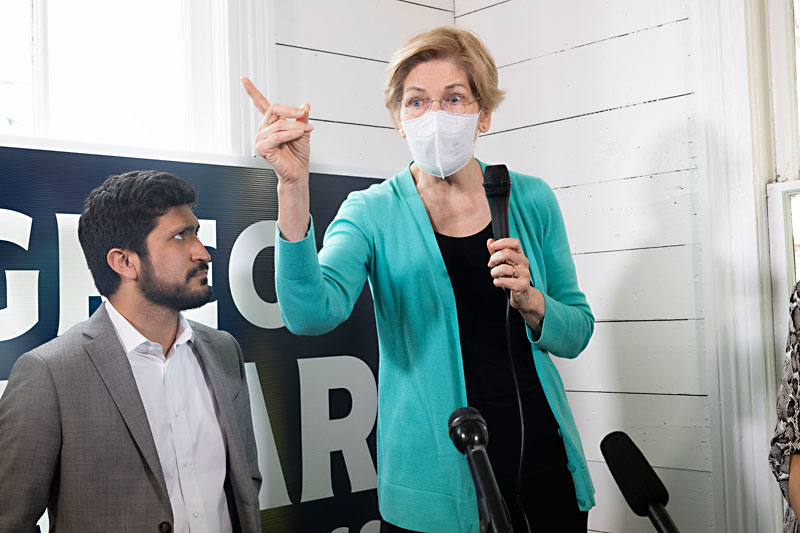“We Need Texas in This Fight”
Elizabeth Warren stumps for Casar, a growing progressive coalition in D.C., and affordable housing
By Austin Sanders, Fri., Feb. 25, 2022

U.S. Sen.Elizabeth Warren (D-MA) has a message for progressives trying to gain more power in the Lone Star State: “We need Texas in this fight.” That was the major talking point as Warren spent her second day in Texas campaigning on behalf of Greg Casar, who is pushing hard to avoid a run-off in his fight against Eddie Rodriguez and Rebecca Viagran in the Democratic primary for the 35th congressional district.
“Texas is such a study in contradictions,” Warren told the Chronicle in a one-on-one interview before her Feb. 23 campaign appearance with Casar at Ani’s Day and Night on East Riverside. “More than a million Texans don't have access to healthcare coverage because of decisions made in Washington on healthcare policies.” It’s people like Casar, Warren said – and Jessica Cisneros, who received support from the senator on Tuesday, Feb. 22 in her primary battle against Rep. Henry Cuellar, D-Laredo – who will fight on behalf of working families for tighter regulation of prescription drug prices, for better health care coverage, and the creation of “good union jobs.”
“Greg is ready to wade into those fights,” Warren said. “He’s a progressive who’s clear on his values and he fights from the heart. That’s the kind of person it’s worth showing up for.” Electing Casar will help grow the progressive coalition in Washington D.C., Warren added, which will help to both win and sustain its policy victories. As one of the leading progressives in the Senate, Warren is no stranger to the sting of failures to get those policies into law, most recently with the Freedom to Vote: John R. Lewis Act and Build Back Better – two bills that couldn’t surmount the objections of conservative Democrats Joe Manchin and Kyrsten Sinema.
Even the wins don’t guarantee smooth sailing, as Casar well knows. Some of his most progressive policy victories on the Austin City Council fell victim to conservative backlash of every kind. His ordinance requiring all local employers to offer paid sick leave was struck down by the all-GOP Texas Supreme Court; efforts to decriminalize homelessness were overturned by conservative Democrats and Republicans at both the local polls and in the Texas Legislature; and Council’s Fiscal Year 2020 budget, which reduced Austin Police Department funding by more than $20 million and set in motion plans to redirect $120 million more, prompted a new Texas law that requires cities gain approval from the Governor’s office before cutting police spending by any amount.
Still, do not be deterred by what could happen following each progressive victory, Warren advised. “You don't get what you don't fight for,” she continued. “It’s better to fight for it, get it passed, show the will of the people and show people what you are willing to do as an elected official.” When the inevitable conservative pushback arrives, “we just get up and get right back in the fight. Because if you don't fight for it, I guarantee it won't happen. So get in the fight, make it happen and then fight like hell to hang on.”
Warren added: “America is a progressive country.” Even when Democrats are in the minority in the House and Senate – which may well be a reality come January 2023 – they represent millions more people than Republicans do. The key to overcoming the institutional barriers that prevent progressive elected officials from enacting the will of that majority is to continue organizing to push those in power toward institutional reform and to vote for political candidates who will push for that change with their own agency. “It's hard when you’ve got to get out there and knock on those doors one more time and one more time,” Warren said. “But that is the future of our nation.”
Our conversation with Warren was focused on the Texas primary, but this City Hall reporter couldn’t resist an opportunity to ask the Senate’s most famous policy wonk a question on the No. 1 issue our readers worry about: housing. Warren, whom the Chronicle Editorial Board endorsed for president in the 2020 Democratic primary, lit up at the chance. “We need more housing supply in this nation,” Warren said simply, pausing for a moment before giving us a head’s up: “Let’s do a policy deep dive for a minute.” Happily, Senator.
“The problem we've got is that over the past four decades there's been a disinvestment in affordable housing,” Warren explained. “For example, the builders that once built the little two bedroom-one bath, post-WWII bungalow that I grew up in aren’t building that anymore. They're building McMansions and they’re doing it because there’s more profit in it.” Sound familiar, Austin real estate observers?
It’s hard to fault developers from maximizing their projects for profit, Warren added, but the result has been a steady depletion of the supply of “entry level housing” for young couples and single people – what Austin has learned to call “missing middle” housing. She also pointed to a failure on the Feds’ part to continue the public housing boom that began in Austin (home to the first federally funded public housing in the nation) in the 1930s under FDR. Primarily, the Faircloth Amendment in 1998 to the Quality Housing and Work Responsibility Act basically prohibits public housing authorities from ever increasing their inventory, only allowing them to replace existing units. (The Housing Authority of the City of Austin has taken advantage of some of the few exceptions to this rule.) The final piece has been a lack of federal investment aimed at maintaining the supply of government-subsidized housing we do have, meager as that inventory may be, to make sure those homes remain safe, comfortable places to live.
“So we’ve got all these factors that have tended to diminish the supply of housing over time at the same time that the population keeps growing,” Warren said. In Austin, that population growth has been explosive – Austin’s five-county metro area has grown by about 84% in the past two decades, with the city itself gaining more than 300,000 new residents within that same period. Austin’s housing market has failed to keep pace with that growth. As one economic consultant explained last year, since 2011, there have been 32,666 more jobs created in Austin than housing units permitted.
What can the federal government do to help cities across the nation deal with this growing problem? Warren was bursting with ideas: a big federal investment in housing – think Austin’s 2018 housing bond, but on a super-sized level – and especially federal dollars that can be leveraged to build more income-restricted housing. More than that, though, the federal government needs to use funding to incentivize city governments into allowing builders to “simply build more housing” by making “housing construction more affordable.”
Warren ticked off some ideas: reduce exclusionary zoning rules, streamline and expedite the housing permitting process, tie transit investments to housing density. “The federal government can play a role by putting money on the table if, for example, Austin will come to the table and show us four ways that they're going to reduce the cost of the private sector bringing new housing on board. We get that supply up and that will help drive down cost.”
Warren’s responses, emphasizing the role the private sector must play in combating the housing supply and affordability problems cities are facing, prompted us to ask: Does the senator consider herself a YIMBY?
“Yes in my backyard,” she responded enthusiastically. “You bet!” In fact, Warren said, she walks the walk as well as talks the talk – nestled behind the Warren’s 3,728 square foot home (built on a 6,030 square foot lot), nearly in their backyard, sits a cozy little condo development.
Got something to say? The Chronicle welcomes opinion pieces on any topic from the community. Submit yours now at austinchronicle.com/opinion.







